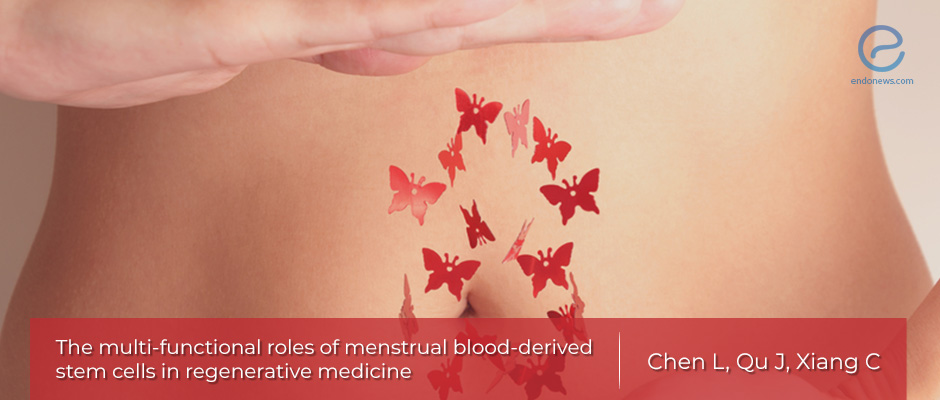Menstrual blood-derived stem cells
Apr 2, 2019
Among other proliferative severe diseases, endometriosis does also have clinical applications and safety concerns of MenSCs
Key Points
Highlights:
- Menstrual blood-derived stem cells (MenSCs) provide an alternative way for therapeutic applications of degenerative diseases such as diabetes, stroke, Duchenne muscular dystrophy, ovarian diseases, myocardial infarction, liver diseases, Alzheimer's disease, Asherman syndrome, acute lung injury, cutaneous wound, neurodegenerative diseases, and endometriosis.
Importance:
- MenSCs are mesenchymal stem cells which discovered in 2007 by Meng et al and Cui et al., from human menstrual fluid and give hope for the future therapies by possessing higher proliferation rates and painless procedures.
What's done here:
- Authors reviewed the literature and assessed their biological potential, immunophenotype, and functions as well as their immunomodulatory properties in several degenerative diseases to advocate the clinical potential of MenSCs,
Key Results:
- Similar to other stem cells, MenSCs have the ability to migrate into injury sites, to evolve into different cell lineages, to secrete soluble factors and to regulate immune responses.
- Nikkoo et al. found that MenSCs can play an important role in cell proliferation, invasion, adhesion and affect some immunomodulatory molecules when they compared women with and without endometriosis.
- In most of the degenerative diseases, the MenSCs researches are in Phase I and II. In these short term studies, authors indicated they are safe and reliable after cell transplantation in mice, regarding the absence of tumor formation and toxicity after administration of MenSCs.
- However, it's not determined how long MenSCs survive in a foreign body and there is no data for their long-term safety owing to lack of specific markers to monitor these cells in vivo.
Lay Summary
Chen et al. from the Center of Diagnosis and Treatment of İnfectious Disease, Zhejiang University, China penned this recent review in the Journal of Stem Cell Research Therapy which is presenting the clinical potential of MenSCs (Menstrual blood-derived stem cells).
The authors touched on multi-functional roles of MenSCs which derived from decidual endometrial cells and have high proliferation rate, pluripotency, low immunogenicity beside their easy collectibility with non-invasive methods. MenSCs also have the ability to differentiate into cardiomyocytic, neurotic, cartilaginous, myocytic, respiratory, pancreatic, hepatic, adipocytic and osteogenic cells when appropriate differentiation techniques used.
Hence endometrium is a part of the mucosal immune system, further research is needed to assess the immunosuppressive effect of MenSCs on immune-related molecules. Some animal models and clinical tests keep going on. Working with MenSCs on liver fibrosis and fulminant hepatitis in animal models gives promising results in improving liver function and survival. Other pleasing results have been provided when MenSCs applied to type I diabetes, ischemic stroke, critical limb ischemia, acute lung injury, cutaneous wound injuries. These cells help to restore by reducing fibroblast and decreasing tissue fibrosis.
Chemotherapy given to ovarian cancer patients develops strict fibrosis near ovaries resulted in POF and infertility. MenSCs administration would help to regain their reproductive functions. Asherman syndrome which is known by intrauterine adhesions and causing problems in conceiving. It has shown that autologous MenSCs administration may be an alternative treatment.
When we come to endometriosis, the authors mentioned that MenScs could also provide necessities to prevent the invasion and progression of this chronic disease. The authors concluded that MenSCs migrate into the inflammatory or injured sites after intravenously injected and they are safe and reliable after transplantation. However, although they provide a regenerative inhibitory effect on inflammation in short-term studies, achieving high quality and high-consistency therapy of MenSCs is still in progress.
Research Source: https://www.ncbi.nlm.nih.gov/pubmed/30606242
menstrual blood-derived stem cells mesenchymal cells adult stem cells cellular therapy menstrual blood regenerative medicine endometriosis.

